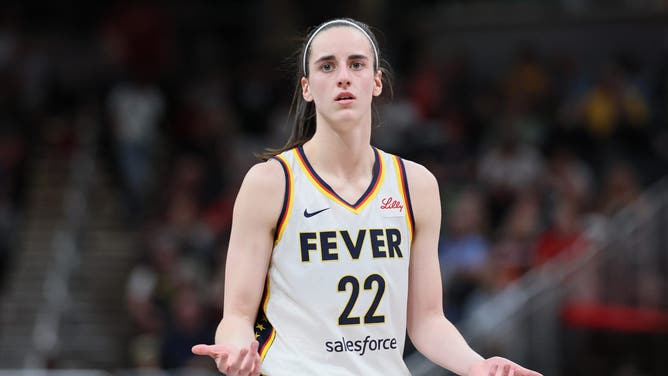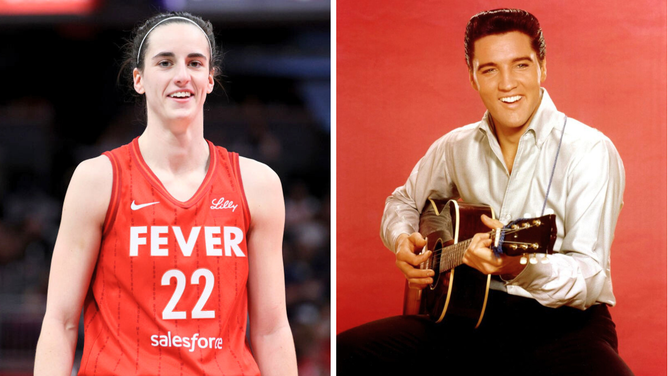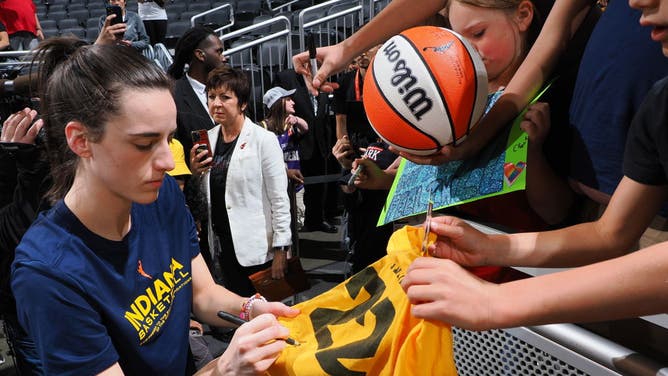'Tennessean' Columnist Compares Caitlin Clark To Elvis Presley, Says 'Whiteness' Makes Them Marketable
Another day, another media member taking issue with Caitlin Clark's skin color. This time, it's The Tennessean's Andrea Williams, who claims Clark's popularity is similar to that of Elvis Presley in the 1950s.
Because both are white, obviously.
Williams originally penned this column on May 25, but it was revived on Thursday via syndication in The Indianapolis Star. Because, for whatever reason, the hometown newspaper of the Indiana Fever felt the need to stir a pot that has already been stirred to exhaustion.

Columnist for ‘The Tennessean’ claims "whiteness is the reason for Caitlin Clark's popularity.
(Photo by Andy Lyons/Getty Images)
Williams begins the piece by introducing us to Sam Phillips, a Memphis-based record executive who produced black blues artists in the 1950s and 60s. But Williams argued that Phillips' artists — including B.B. King, Little Milton and Howlin Wolf — weren't marketable at the time because of their skin color.
"If I could find a white man who had a Negro sound and a Negro feel," Phillips once said, "I could make a million dollars."
And that's when he found Elvis, who signed with Phillips' Sun Records in 1953 and went on to become a legendary musical and cultural icon.
Williams said it was not Elvis' talent, but rather his "whiteness" and his "appropriation of blackness" that made him a superstar. Kind of like, in her mind, what's happening with Caitlin Clark in the WNBA.
"In America — a predominantly white society with a very long record of white supremacist ideologies — whiteness becomes the primary standard by which all is measured and, in business, the primary market to which all products are targeted," Williams wrote.

Successful white people, Caitlin Clark and Evlis Presley
(Getty Images)
Now, could you make that argument in 1953 — before the Civil Rights Movement, when black Americans were segregated and didn't enjoy the same rights as white Americans? Sure.
But we've come a long way in 70 years. And there's simply no comparison between black athletes in 2024 and black musicians during the Jim Crow Era.
Caitlin Clark Has Skyrocketed The Popularity Of The WNBA
Now, this is where Andrea Williams would chime in and say that historical context matters — that some deeply-rooted and centuries-long tradition of white supremacy affects how sports fans see Clark as opposed to her black counterparts, like A'ja Wilson or Angel Reese.
That's why Clark has a $28-million signature shoe deal while, "before A’ja Wilson’s recently announced Nike deal, no black WNBA player has had a signature shoe with a major brand since Candace Parker in 2010-11."

A'Ja Wilson and Caitlin Clark both signed Nike shoe deals this spring.
(Credit: Getty Images)
So, according to Williams, race relations of the past have prevented today's black athletes from gaining the notoriety they deserve. Because it's "whiteness" that makes a person marketable.
But tell that to Michael Jordan, LeBron James, Kobe Bryant, Kevin Durant, Paul George, Ja Morant, Steph Curry, James Harden… I could go on all day. All black basketball players. All have signature shoes. And brand deals aside, not even Andrea Williams can argue that black male athletes have been hurting for popularity in the NBA.
And if that's not good enough for you, let's look at predominately "white" sports: The most decorated (and richest) golfer of all time is Tiger Woods. The highest-earning women's tennis players ever are Serena and Venus Williams. Black athletes are doing just fine.
So maybe it's not black women's basketball players who aren't marketable. Maybe it's women's basketball, in general.
Since its inception in 1996 (the first season was in 1997), the WNBA has failed to turn a profit every single year. The league is subsidized entirely by the NBA. Plenty of non-black star players — including Diana Taurasi, Sue Bird and Elena Delle Donne — have come along and failed to move the needle.
Much to Andrea Williams' dismay, though, Caitlin Clark changed the game. She can speculate all she wants on the reasons for Clark's popularity. Likely, there are many. But to reduce NCAA Division I basketball's highest scorer to her skin color is just as racist and as insulting as she accuses all sports fans of being.

Caitlin Clark signs autographs for Indiana Fever fans.
(Photo by Ron Hoskins/NBAE via Getty Images)
A quick peek at Williams' author page at Tennesssean.com shows she looks for racism in everything from sports to education to music. It's her whole job. She claims we should learn from the racism of the past — all while desperately clinging to it, insisting on its existence and, thus, constantly giving it life in the present.
"Instead of learning from this moment and having real-time conversations about the intersection of race, gender, and sports in America, those of us who know better end up screaming into an empty, useless void while everyone else holds fast to their unfounded, ahistorical views," Williams wrote.
Those of us who know better, she says. Imagine being THAT confident in your mental and moral superiority over everyone else.
But she's right about one thing: Williams, along with her race-baiting peers, are, in fact, "screaming into an empty void." They're begging for validation and relevancy on a ship that's already sailed.
Caitlin Clark and Elvis Presley never had to do that.